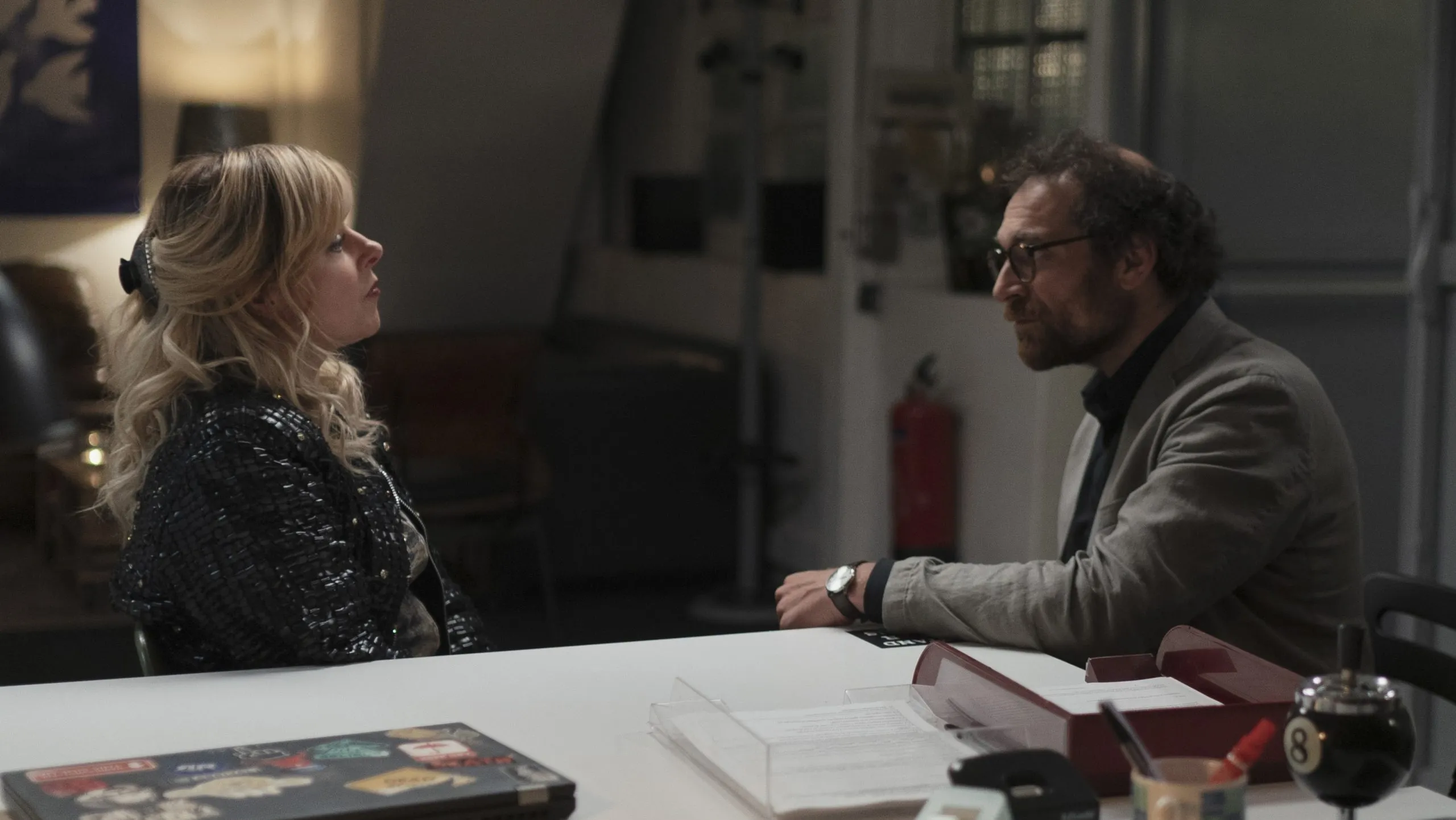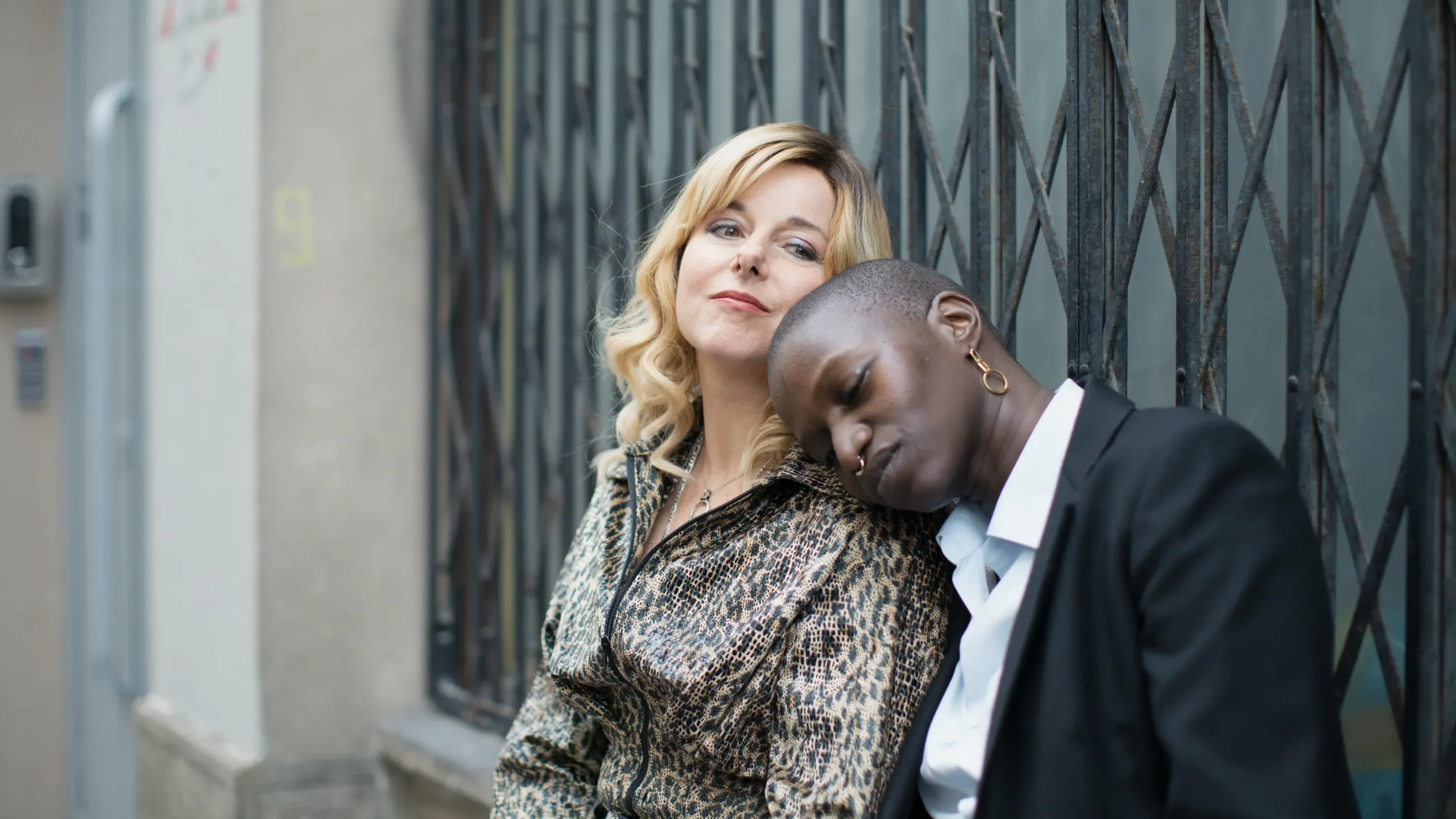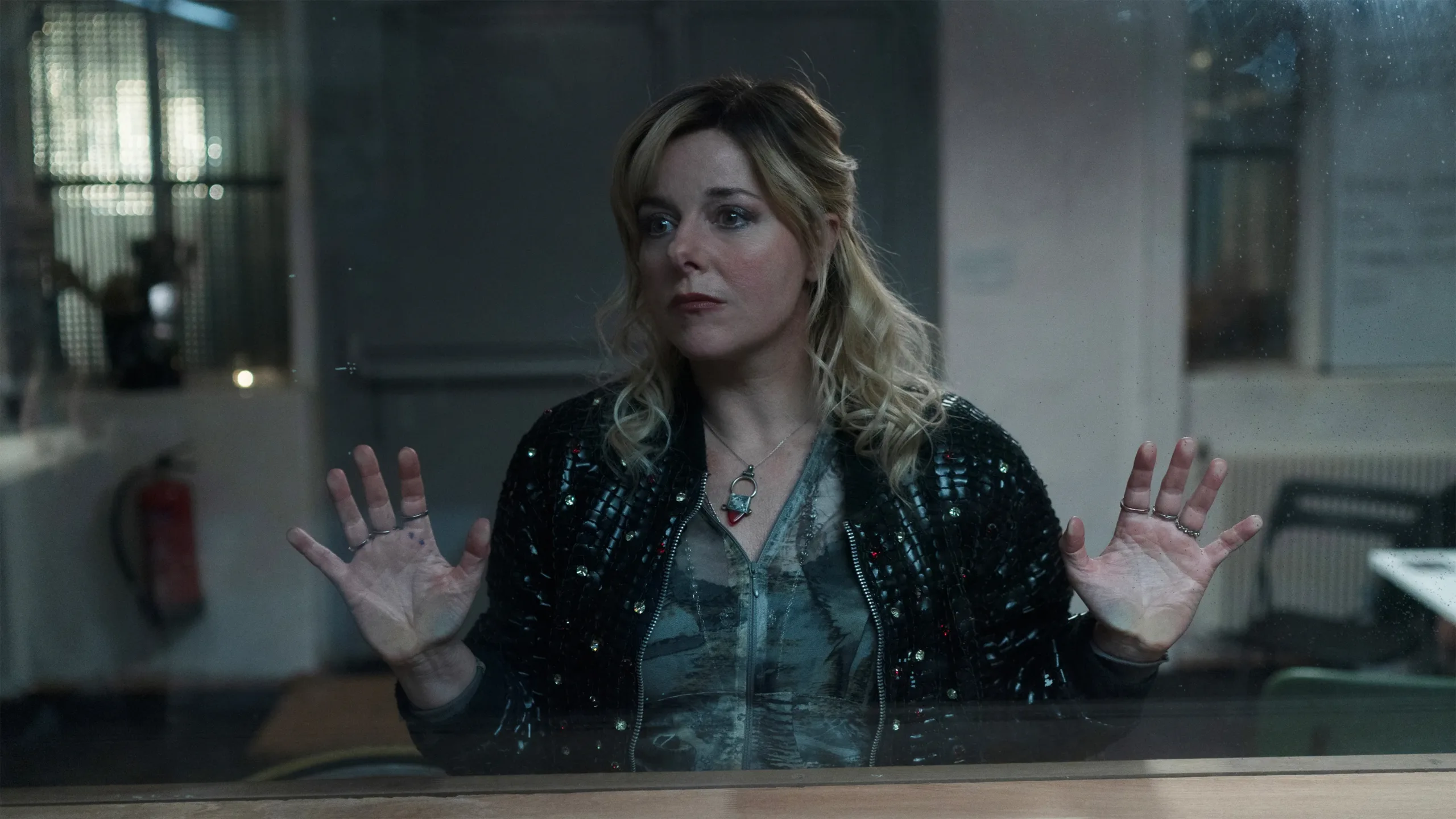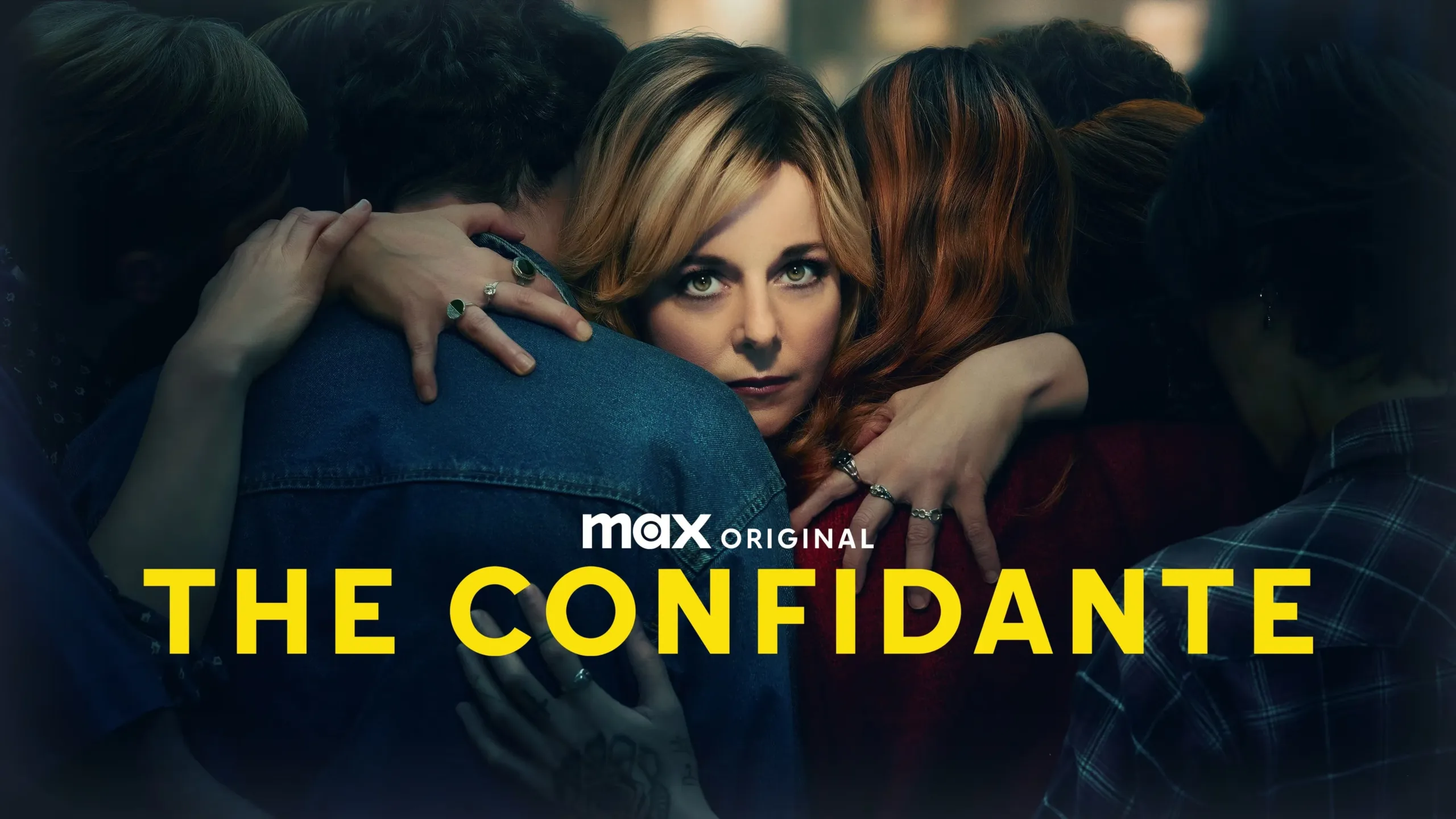The Confidante’s central theme is a spooky look at empathy as a cover for deception. In the aftermath of the 2015 Bataclan terrorist attack, Chris (Laure Calamy), a woman, makes up a connection to the tragedy by saying her best friend is a victim. This is the central plot of the narrative.
This false victimhood not only shows her desperate quest for belonging but also serves as a disturbing commentary on the need for trauma and resilience stories in society. Chris represents the allure of human connection and the darker urges of manipulation by making friends with people who help survivors.
The series builds tension as Chris tries to balance her two lives: she is both a caring friend and a dishonest con artist. In key moments, like when she goes to the hospital to pretend to care for a comatose “friend,” she seems eerily detached from reality. The narrative tension rises as her lies get bigger, especially when people in the survivors’ group start to doubt her quest.
This dynamic mirrors a larger societal talk about trust, authenticity, and the narrative of social media, where narratives can be curated and manufactured with alarming ease. The show does a great job of showing the fragility of human relationships in crisis, and it makes viewers think about the thin line between real empathy and exploitative behavior in the age of connectivity.
The Confidante, through Chris’s journey, not only entertains but also makes you reflect on how trauma narratives are made, consumed, and, ultimately, commercialized in today’s culture.
The Complex Web of Deception: Unpacking Chris in The Confidante
Chris, played by Laure Calamy with disturbing depth, is a very modern anti-heroine whose goals are as complicated as the society she manipulates. Her character seems to fit the mold of the sad figure looking for comfort in the wake of trauma at first glance.
The narrative, however, makes it clear that her need for connection is linked to a serious mental illness called mythomania. Chris’ deceptions reflect a desperate attempt to retake agency in a world that has made her invisible. They are not just self-preservation strategies. Her constant lies protect her from genuine human connection while also allowing her to survive the grief-stricken landscape.
This duality illustrates the lengths people will go to find belonging in a broken community, which is a bigger societal problem. As a result of her unstable relationship with her mother and her lack of personal identity, Chris makes up links with the Bataclan attack survivors. This image hits home with modern audiences because it speaks to social media culture, where curated identities often take precedence over real experiences.
In The Confidante, the supporting characters, especially Emilie and Leon, reflect Chris’ complexity and the show’s main themes. Emilie, a real survivor, embodies the emotional stakes of the narrative. Her interactions with Chris swing back and forth between friendship and mistrust, illustrating how trauma can both strengthen bonds and plant doubts. Emilie’s deception makes her an unwitting accomplice in Chris’s deception, highlighting the precarious nature of trust in the aftermath of collective trauma.
Leon, on the other hand, speaks with doubt and reason. His rising doubts about Chris’s authenticity create a palpable narrative tension. As Leon looks into her past, his character turns into a way to discuss the moral problems with telling the truth in the context of everyone’s pain. The way they interact with each other not only adds to the psychological tension but also raises important moral questions about the people who say they support victims.
Together, these relationships represent the series’ investigation of empathy and exploitation, illustrating how personal narratives can be beneficial and harmful. The Confidante pushes viewers to grapple with the complexities of human connection in a time when the line between truth and deception is becoming increasingly hazy through Chris and her deception.
Threads of Deception: Navigating Trauma and Identity in The Confidante
A deep examination of deception, encapsulated in Chris’s constant lies, is central to The Confidante. These lies are more than just plot devices; they reflect a deeper psychological battle similar to problems in modern society. Chris’s lying serves as a coping strategy, illustrating the complexities of mythomania—a condition that makes the lines between reality and fiction fuzzy.
People around her are affected by her lies, which creates a web of misunderstanding and mistrust in the community of survivors. It serves as a stark warning of how personal narratives can be weaponized, turning empathy into a weapon of manipulation.
In an age dominated by social media, this theme of deception encourages viewers to reflect on the nature of truth. In a world where carefully managed identities are more common than real experiences, Chris’s story is a scary look at how empathy is performed. Her ability to draw people in and take advantage of their weaknesses raises an important question: how far will someone go to be seen and accepted? The audience is asked to think about their parts in the narratives they deal with, both online and offline, in this exploration of truth and falsehood.
The series’ moving depiction of trauma and the never-ending search for belonging goes hand in hand with the deception theme. In The Confidante, the aftermath of the Bataclan attack is handled skillfully, drawing viewers into the emotional turmoil that survivors were going through. In the wake of a group trauma, the series shows how grief can show up in both connection and isolation. With this tragedy as a background, Chris’s journey shows how hard it is for many people to find community after losing someone close to them.
As each character grapples with their own experiences of pain and resilience, the search for identity among survivors is a key motif. Interactions within the support group reflect different levels of vulnerability and strength, illustrating the complexities of human connection in a broken world. Chris’s lies give the impression of unity, but they show the painful reality that many victims face: an overwhelming sense of connection even when they’re around other people who have the same scars.
This complex portrayal of trauma not only highlights the fragility of human relationships but also contributes to larger conversations in society about mental health and healing. By doing this, The Confidante fits into a growing TV trend that wants to change standard narratives to give a more real and complex look at modern problems. The series challenges viewers to face the uncomfortable truths beneath the surface of their individual and group identities by looking at how deception and the quest for belonging interact.
Crafting Deception: The Performance and Direction in The Confidante
Calamy does an amazing job with Chris in The Confidante. He shows how to show many different emotions. Calamy does a great job of navigating her character’s complicated mind, capturing the fine line between manipulation and vulnerability. Her performance immediately immerses viewers in Chris’s world, where every smile conceals deeper fears and every kind of act conceals a darker goal.
Calamy’s ability to switch between real empathy and shocking deceit is demonstrated in notable scenes, such as her interactions with other survivors in the hospital. In one particularly striking moment, she pretends to be sad about a comatose “friend,” her facial expression changing from genuine worry to a small flicker of victory when she thinks her deception is working. This emotional range amplifies the series’ main themes of trust and betrayal, which also shows Calamy’s skill.
Thanks to Just Philippot’s directing style, the narrative is both personal and unsettling, which goes well with Calamy’s performance. Philippot uses a slow-burn technique, allowing the drama to build slowly as Chris’s lies deepen. The speed of the story matches how the main character’s mind is falling apart, creating a very tense environment. The careful attention to detail in each scene heightens the emotional engagement and challenges viewers to grapple with their responses to Chris’s increasingly questionable claims.
The series’ tone changes reflect a deep understanding of the material’s gravity, running from somber reflections to dark, ironic moments. In the aftermath of trauma, Philippot’s direction highlights the subtleties of human contact while capturing the fragility of relationships. The director forces viewers to face uncomfortable truths about authenticity and connection in a world where deception can easily pass as compassion by contrasting Chris’s mask with the unfiltered emotions of the other characters.
Together, Calamy’s moving performance and Philippot’s expert direction weave a compelling narrative tapestry that not only keeps the audience interested but also makes them reflect on the nature of truth in a complex society.
Visual Narratives: The Cinematography and Production of The Confidante
The stark and evocative visual style of The Confidante adds to the emotional weight of the narrative. The film’s muted color palette and close-ups of people nearby create a feeling of claustrophobia that matches Chris’s mental confinement.
Each frame is carefully put together, allowing the audience to feel her world’s stress and hopelessness. In stark contrast to Chris’s lies, which are made up, natural lighting gives the story a sense of authenticity. Scenes that take place in the survivors’ support group, for example, are bathed in soft, warm light, creating a false sense of safety that is quickly shattered by Chris’s lies.
The production value of The Confidante is also very good, with great attention to detail that makes the experience better. What the characters feel is reflected in the setting, from the hospital hallways to Chris’s home, which is both cozy and chaotic. Among the most impressive technical feats is the seamless merging of social media elements into the story, which can be seen through screen captures and text messages that break up the narrative.
This more contemporary method not only improves the storytelling but also shows how much of an impact digital communication has on modern trauma narratives. The series successfully captures the complicated dynamics of truth and deception in a world increasingly defined by the stories we create online by weaving these visual techniques into the storyline.
Echoes of Trauma: Cultural and Social Context in The Confidante
The historical context of the 2015 Bataclan attack dominates The Confidante, giving the narrative a sense of urgency and weight. The series deals with the aftermath of this real-life tragedy, highlighting how deeply it affected the survivors and their families.
With this background, the show has to be careful not to offend anyone, even as it explores darker themes of lying and taking advantage of people. The series raises important questions about the morality of telling stories in the wake of real suffering by incorporating Chris’s made-up narrative into the plot of this trauma. It forces viewers to think about the implications of using real events as a backdrop for fiction, especially when the lines between victim and perpetrator are fuzzy.
The Confidante speaks deeply to a modern audience struggling with problems of truth and the nature of identity in the age of social media. The series skillfully shows how online platforms can change people’s narratives, allowing them to create identities that may have nothing to do with reality. The quest for validation frequently precedes authenticity, which is reflected in Chris’s manipulation of social media.
This exploration of a theme encourages viewers to reflect on their interactions with digital spaces, highlighting the fragility of trust in a culture full of carefully chosen personas. As a result, the series engages with the specifics of its narrative and serves as a mirror to current societal dynamics, sparking important conversations about the complexities of truth and representation in our connected world.
Reflections on Deception: Final Thoughts on The Confidante
The Confidante presents a compelling narrative with cultural importance and psychological depth. Its highlights are Laure Calamy’s outstanding performance and the series’ thoughtful engagement with trauma and identity themes.
Thanks to the complex character growth, especially of Chris, viewers are invited to grapple with their own perceptions of truth and empathy. However, the pacing occasionally slows down, resulting in moments where the tension drops instead of rising, which could lose some viewers.
This series is a must-watch for those interested in the psychological bases of human behavior, especially in the context of contemporary trauma and social media’s widespread impact. Audience members who enjoy character-driven narratives that challenge traditional storytelling will enjoy it.
The Confidante offers a thought-provoking study of the darker sides of human connection, making it a worthwhile effort for viewers willing to face uncomfortable truths, even though it might not appeal to those seeking lighthearted entertainment.
The Review
The Confidante
The Confidante is a haunting look at identity, trauma, and the complexities of truth in the digital age. The series forces viewers to face uncomfortable truths about empathy and deception due to Laure Calamy's outstanding performance and a narrative that skillfully combines real-life tragedy with psychological intrigue. Even though the pace isn't always steady, this show is a great addition to modern TV because it's so deep and relevant. People who want to be moved to tears should watch this captivating story about human connection and disconnection.
PROS
- Strong performance by Laure Calamy, showcasing emotional depth.
- Engaging exploration of trauma and identity.
- Thought-provoking themes related to social media and truth.
- Stylish cinematography that enhances storytelling.
- Relevant cultural commentary on contemporary societal issues.
CONS
- Pacing issues that occasionally disrupt tension.
- Some viewers may find the subject matter too heavy or uncomfortable.
- Limited representation in supporting characters.





















































